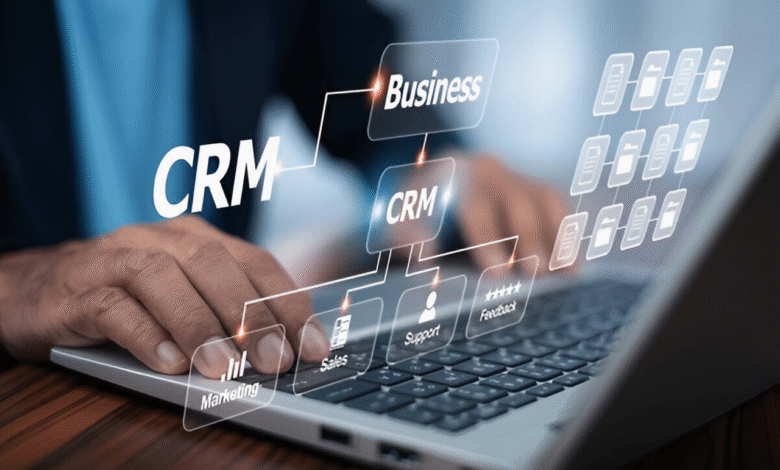How to Choose the Right CRM Software for Your Business
CRM software guide. Learn how to choose the best CRM for your business needs, budget, and growth. Compare top solutions today.

Selecting the right CRM software is one of the most critical decisions a business can make to enhance customer relationships, streamline operations, and drive growth. With countless options available from industry giants like Salesforce to affordable solutions like Zoho CRM finding the perfect fit requires careful consideration. This comprehensive guide will walk you through the essential factors to evaluate, including business needs, scalability, integration capabilities, and pricing. By the end, you’ll have a clear understanding of how to choose a CRM that aligns with your company’s goals and maximizes efficiency.
(Customer Relationship Management) CRM Software is designed to centralize customer interactions, automate sales and marketing processes, and provide actionable insights through data analytics. A well-implemented CRM Software can significantly improve customer retention, boost sales productivity, and enhance team collaboration. Whether you’re a small business looking for a cost-effective solution or a large enterprise needing advanced automation, the right CRM can transform how you engage with customers. The challenge lies in navigating the vast array of options available.
How to Choose the Right CRM Software for Your Business
Defining Your Business Needs and Objectives
Before exploring CRM options, it’s essential to identify the specific pain points you aim to address. Are you struggling with lead management, customer service efficiency, or sales tracking? Different CRM Software platforms cater to different needs some prioritize sales automation like Pipedrive, while others emphasize marketing like HubSpot or customer support like Zendesk. Conducting an internal audit of your workflows will help narrow down the best CRM Software for your business.
Scalability for Future Growth
A CRM should not only meet your current needs but also adapt as your business expands. Startups may initially require basic contact management, but as operations grow, features like advanced reporting, AI-driven insights, and multi-department collaboration become necessary. Cloud-based CRMs such as Salesforce and Microsoft Dynamics 365 offer scalable solutions, whereas open-source platforms like SuiteCRM provide customization flexibility for businesses with unique requirements.
Integration with Existing Tools
A CRM Software that doesn’t integrate seamlessly with your current software ecosystem can create inefficiencies. Key integrations may include email platforms Gmail, Outlook, marketing tools Mailchimp, ActiveCampaign, accounting software QuickBooks, Xero, and helpdesk systems Freshdesk, Intercom. Before committing, verify whether the CRM supports API connections or pre-built integrations to ensure smooth data flow across systems.
User Experience and Adoption Rates
Even the most feature-rich CRM Software will fail if employees resist using it. A user-friendly interface with intuitive navigation, drag-and-drop functionality, and mobile accessibility encourages adoption. Look for platforms that offer training resources, onboarding support, and customizable dashboards to match your team’s workflow. CRMs like HubSpot and Zoho CRM are known for their ease of use, making them ideal for businesses with non-technical users.
Salesforce & Pipedrive
Best for large enterprises, Salesforce offers unparalleled customization, AI-powered analytics Einstein AI, and extensive third-party integrations. Its scalability makes it a favorite among growing businesses. Ideal for large enterprises, Salesforce offers robust automation, AI-driven analytics, and extensive third-party integrations. A sales-focused CRM, Pipedrive excels in pipeline management with a visually intuitive interface, making it a top choice for sales teams.
Budget and Return on Investment (ROI)
CRM Software pricing varies widely some charge per user per month, while others offer flat-rate plans. While cost is a significant factor, businesses must also consider long-term ROI. Free or low-cost CRMs such as Bitrix24 may suffice for small teams, but enterprises may benefit from premium solutions like Salesforce, which offer advanced analytics and automation. Additionally, factor in hidden costs like setup fees, training, and third-party integrations.
Types of CRM Software and Their Use Cases
Operational CRM
Operational CRMs focus on automating day-to-day business processes, including sales, marketing, and customer service. They help manage leads, track customer interactions, and streamline communication. Examples include Salesforce Sales Cloud and Pipedrive, which are ideal for sales-driven organizations. Some CRMs focus on sales pipeline management, while others excel in customer support or marketing automation. Focuses on automating sales, marketing, and customer service processes.
Analytical CRM
Analytical CRMs specialize in data mining and customer behavior analysis. They aggregate data from multiple touchpoints to generate insights for targeted marketing campaigns and sales strategies. SAP CRM and Microsoft Dynamics 365 (with Power BI integration) are powerful tools for data-driven decision-making. Emphasizes data analysis to improve customer relationships. It collects and processes customer data to generate insights for targeted marketing and sales strategies. Tools like SAP CRM fall under this category.
Collaborative CRM
Collaborative CRMs enhance communication between internal teams and external partners by centralizing customer data. These platforms ensure that sales, marketing, and support teams have access to unified customer profiles. Solutions like SugarCRM and Nimble facilitate seamless collaboration across departments. Enhances communication between departments and external partners. It ensures all teams sales, marketing, support have access to unified customer data. Solutions like SugarCRM facilitate collaboration.
HubSpot CRM
Ideal for small to mid-sized businesses, HubSpot provides a free tier with essential features and scalable premium plans for marketing, sales, and service automation. A user-friendly option for small to mid-sized businesses, HubSpot provides free basic features with scalable premium plans. Whether you opt for a cloud-based solution or an on-premise system, the key is to ensure it enhances productivity and fosters stronger customer relationship.
Zoho CRM
A cost-effective yet powerful solution, Zoho CRM offers automation, multichannel support, and deep customization, making it suitable for startups and SMBs. Affordable and customizable, Zoho CRM suits growing businesses with its automation and multichannel support. A well-chosen CRM will not only streamline processes but also provide actionable insights to drive growth.
Read More: How to Use ChatGPT for Marketing Automation in 2025
Conclusion
Choosing the right CRM software is a strategic investment that can redefine your customer relationships and operational efficiency. By evaluating your business needs, scalability requirements, integration capabilities, and budget, you can select a CRM that not only addresses current challenges but also supports future growth. Take advantage of free trials and demos to ensure the platform aligns with your team’s workflow before making a final decision.
A well-implemented CRM system will streamline processes, enhance customer engagement, and provide valuable insights to drive business success. Whether you opt for a cloud-based solution like Salesforce or an open-source platform like SuiteCRM, the key is to choose a system that evolves with your business and maximizes productivity across all departments. To make an informed decision, businesses must assess their unique requirements, budget constraints, and long-term growth plans.
FAQs
What is the main purpose of CRM software?
CRM software helps businesses manage customer interactions, automate sales and marketing processes, and improve customer retention through centralized data management.
How much does a CRM system typically cost?
CRM costs vary some offer free plans (HubSpot, Bitrix24), while enterprise solutions (Salesforce, Dynamics 365) can range from 25to300+ per user per month.
Which CRM is best for small businesses?
Zoho CRM, HubSpot CRM, and Freshsales are excellent choices for small businesses due to their affordability, ease of use, and scalability.
Can a CRM integrate with other business tools?
Yes, most modern CRMs support integrations with email, marketing automation, accounting software, and customer support platforms via APIs or native connectors.
Is a cloud-based or on-premise CRM better?
Cloud-based CRMs offer flexibility, automatic updates, and remote access, while on-premise solutions provide greater data control and security for regulated industries.












One Comment